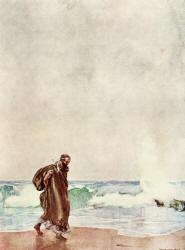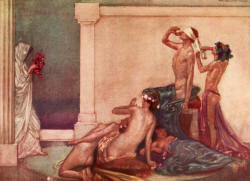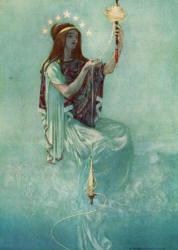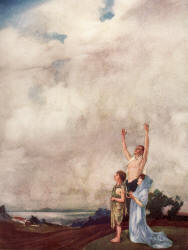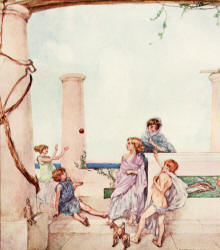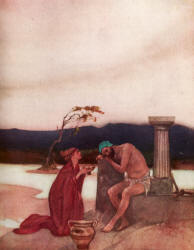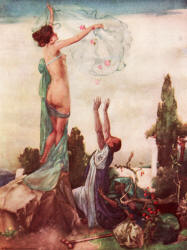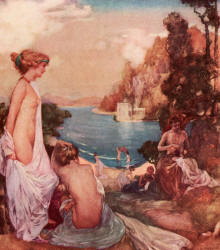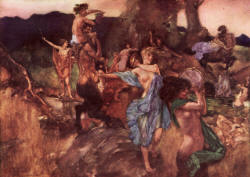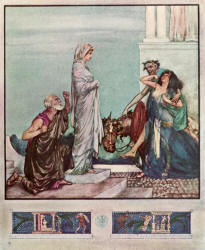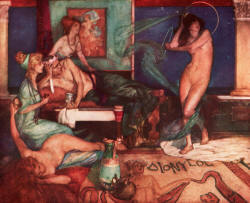"The
Thoughts of the Emperor Marcus Aurelius Antoninus" (1909)
Illustrated by William Russell Flint
"The
Thoughts of the Emperor Marcus Aurelius Antoninus" (1909) was based
upon a translation - undertaken by George Long - of the surviving
recorded
thoughts of the Stoic Philosopher and Roman Emperor, Marcus Aurelius
Antoninus.
Long provides
a description of the education provided to Antoninus by his own family and
his father through adoption, Antoninus Pius (who was
Emperor prior
to his adopted son) in the following manner:
The youth was most carefully brought up. He
thanks the gods that he had good grandfathers,
good parents, a good sister, good teachers,
good associates, good kinsmen and friends,
nearly everything good. He had the happy
fortune to witness the example of his uncle and
adoptive father Antoninus Pius, and he has
recorded in his work the virtues of this excellent
man and prudent ruler. Like many young Romans
he tried his hand at poetry and studied
rhetoric. Herodes Atticus and M. Cornelius
Fronto were his teachers in eloquence. There
are extant letters between Fronto and Marcus,
which show the great affection
of the pupil
for the master, and the masterís great hopes
of his industrious pupil. M. Antoninus mentions
Fronto among those to whom he was indebted
for his education.
When he was eleven years old, he assumed the
dress of philosophers, something plain and
coarse, became a hard student, and lived a
most laborious, abstemious life, even so far as
to injure his health. Finally, he abandoned
poetry and rhetoric for philosophy, and he attached
himself to the sect of the Stoics. But he did
not neglect the study of law, which was a useful
preparation for the high place which he was
designed to fill. His teacher was L. Volusianus
Maecianus, a distinguished jurist. We must
suppose that he learned the Roman discipline of
arms, which was a necessary part of the
education of a man who afterwards led his troops to
battle against a warlike race.
Long also writes of the enduring legacy of Antoninus -
particularly as it relates to his meditations - thus:
The little book of Antoninus has been the
companion of some great men. Machiavelliís ďArt
of WarĒ and Marcus Antoninus were the two books
which were used when he was a young
man by Captain John Smith, and he could not have
found two writers better fitted to form the
character of a soldier and a man. Smith is almost
unknown and forgotten in England, his
native country, but not in America, where he
saved the young colony of Virginia. He was
great in his heroic mind and his deeds in arms,
but greater still in the nobleness of his
character. For a manís greatness lies not in
wealth and station, as the vulgar believe, nor yet
in his intellectual capacity, which is often
associated with the meanest moral character, the
most abject servility to those in high places and
arrogance to the poor and lowly; but a manís
true greatness lies in the consciousness of an
honest purpose in life, founded on a just
estimate of himself and everything else, on
frequent self-examination, and a steady obedience
to the rule which he knows to be right, without
troubling himself, as the emperor says he should
not, about what others may think or say, or
whether they do or do not do that which he thinks
and says and does.
|
.jpg)
%20(250).jpg)
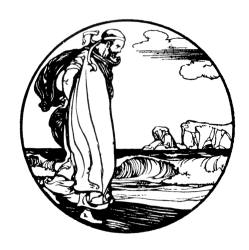
%20(sample).jpg)
%20(sample)%20(rear).jpg)
.jpg)
![William Russell Flint - 'From Diogentus [I learned] not to busy myself about trifling things' from ''The Thoughts of the Emperor Marcus Aurelius Antoninus'' (1909)](WRF%20TEMAA%20C1.jpg)
